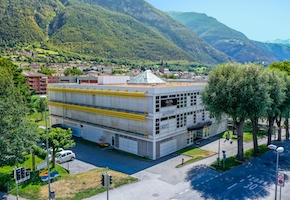- About
- Programs
- Innovation & Research
- Campus Life
- Career Services
- Admissions
- News & Events
- Alumni
Groundbreaking Innovations: Disrupting the Hospitality Industry
Discover the future of hospitality!
What are the latest trends and technologies disrupting the hotel and restaurant industry?
Groundbreaking Innovations:
Disrupting the Hospitality Industry
Have you noticed how hotels and restaurants are capitalizing on rapid changes in technology? The hospitality industry is undergoing a transformative shift, driven by new advancements and innovative business ideas. The César Ritz Culinary School prizes innovation; here, you’ll learn about the exciting changes in the sector that will give you a head-start on an incredible career.
In this special feature, we explore the cutting-edge innovations redefining hotels and restaurants around the world. We dive into real-world examples from leading companies and innovators, showing how these breakthroughs are not only enhancing guest experiences but also reshaping the entire industry. Get ready to discover the future of hospitality!
1. Smart Rooms and Kitchens
Imagine controlling your hotel room's lighting and temperature with a simple voice command, or robots who prepare your meals in minutes. These aren't futuristic dreams—they're happening right now! Smart technology is revolutionizing guest experiences and commercial kitchens by integrating advanced systems for a personalized, seamless experience. Here are just a few examples:
RoomRaccoon: This Dutch company offers smart room controls for hotels, allowing guests to manage lighting, temperature, and entertainment through mobile devices. This technology not only enhances guest comfort but also improves energy efficiency, making it a win-win for both hotels and their guests.
StayNTouch: Skip the check-in desk! A mobile hotel property management system, StayNTouch includes smart room functionalities, allowing guests to check in, access their rooms with digital keys, and control room settings via smartphones.
Spyce, The Robotic Kitchen Revolution: No, robots won’t be replacing chefs anytime soon, but Spyce, a Boston-based restaurant that was acquired by Sweetgreen in 2021, epitomizes the future of what an automated kitchen can look like. With its MIT-developed robotic system "Infinite Kitchen," Spyce uses conveyor belts to move ingredients into automated woks, which cooks the dishes to perfection. The process is designed to ensure consistency and speed, with each meal cooked in under three minutes. This innovation not only reduces labor costs but also minimizes food waste through precise portion control. In 2023, Sweetgreen opened its first robot-driven Infinite Kitchen using the Spyce technology.
Flippy, The Robotic Chef: Another notable example is Flippy, a robotic kitchen assistant developed by Miso Robotics. Flippy can perform a range of kitchen tasks with remarkable accuracy, from grilling burgers to frying chicken. It uses machine learning to improve its performance over time, ensuring that each dish meets exacting standards. Flippy is already being employed in fast-food chains like White Castle, where it enhances kitchen efficiency and food safety by reducing human contact with raw ingredients.
2. Sustainability and Eco-Friendly Practices
Sustainability is increasingly a core focus in the hospitality industry, with eco-conscious travelers preferring accommodations and restaurants that reduce environmental impacts. There’s a wide range of exciting examples of how technology is changing hospitality for the better, including:
EcoHotels.com: EcoHotels.com started as a niche online booking platform for eco-friendly hotels and has grown rapidly by tapping into the growing demand for sustainable travel options. The platform partners with hotels that adhere to strict environmental standards, promoting properties that implement energy-saving technologies, waste reduction practices, and sustainable sourcing.
Scandic Hotels: Scandic Hotels has been a pioneer in sustainability, implementing practices such as eliminating single-use plastics, using renewable energy, and offering plant-based dining options. Their "Better Food" initiative focuses on providing healthy and sustainable food choices, aligning with their broader environmental goals.
Vertical Farming: As sustainability becomes a central concern in hospitality, innovations in agriculture are playing a pivotal role in reshaping how food is produced and consumed. Vertical farming offers a sustainable solution to the challenges of traditional agriculture, such as land scarcity, and resource inefficiency.
AeroFarms: A leader in the vertical farming industry, AeroFarms utilizes aeroponic technology to grow crops in vertically stacked layers, using 95% less water and no pesticides. This method allows for year-round cultivation in controlled environments, ensuring consistent quality and yield. AeroFarms' produce is renowned for its freshness and nutritional value, making it a preferred choice for high-end restaurants and hotels seeking sustainable ingredients.
Infarm: Germany’s Infarm brings vertical farming into grocery stores and restaurants, allowing them to grow their own herbs and vegetables on-site. This reduces transportation costs and ensures freshness, aligning with sustainability goals and providing customers with ultra-fresh produce.
Beyond Meat: The rise of plant-based and lab-grown meats is reshaping the culinary landscape, driven by health, ethical, and environmental concerns. Beyond Meat, for instance, produces plant-based meat alternatives from pea protein, offering products that mimic the taste and texture of traditional meat. Their products are available globally, appealing to both vegans and meat-eaters seeking sustainable options.
Upside Foods: This American company is pioneering lab-grown meat by cultivating animal cells to produce real meat without livestock farming. This innovative approach aims to reduce the environmental and ethical impacts of traditional meat production.
Winnow Solutions: Reducing food waste is a crucial component of sustainability, so Winnow Solutions uses AI to help commercial kitchens reduce food waste. Their system tracks and analyzes waste, providing real-time insights to chefs and managers.
Too Good To Go: This app connects consumers with surplus food from restaurants and bakeries at reduced prices. By rescuing unsold food, the app helps businesses reduce waste and offers consumers affordable meals, promoting sustainability in communities across Europe and North America.
3. Contactless Services
The COVID-19 pandemic accelerated the adoption of contactless technologies, enhancing safety and convenience for guests and diners. The industy continues to see widespread implementation of digital platforms that allow guests to check in and out without physical contact, such as Operto or Aeroguest, and contactless dining solutions like Presto (which includes QR code menus, mobile ordering, and payment options).
Another innovation is virtual concierge services powered by artificial intelligence and chatbots, which provide personalized assistance and enhance guest engagement. There are numerous examples out there, such as Guestline and ALICE, which provide personalized recommendations and assistance.
The Cosmopolitan Las Vegas’ chatbot, Rose, is a novel and fun variation: “If you’re looking for trouble, I can hook you up with the best we have to offer,” says Rose. Described as the Resident Mischief-Maker and Digital Concierge, Rose engages with guests through text messages, offering witty responses along with recommendations for dining, entertainment, and hotel services.
4. Augmented and Virtual Reality
AR and VR technologies are transforming guest and diner experiences by offering immersive, multi-sensory experiences that enhance guest engagement. Here are just a few notable examples:
The VOID: The VOID began as a small VR entertainment company and has expanded by partnering with hotels and resorts to offer immersive virtual reality experiences. Guests can enjoy VR adventures that transport them to different worlds, adding unique dimensions to their stay.
Marriott's VRoom Service (USA): This futuristic service allows guests to experience virtual reality through in-room headsets. Guests can embark on virtual journeys, exploring destinations and cultural experiences from the comfort of their hotel rooms.
Le Petit Chef (France): Le Petit Chef uses AR to project a tiny chef onto diners’ tables, who "cooks" their meals in an entertaining show. This interactive dining experience combines storytelling with gourmet cuisine, captivating guests and enhancing their dining experience.
Sublimotion (Spain): Sublimotion, located in Ibiza, offers a unique dining experience by combining VR with haute cuisine. Guests wear VR headsets that transport them to different environments, creating an immersive experience that complements the culinary journey.
Embracing the Future
The hospitality industry isn’t just evolving—it’s soaring into a new era that is reshaping guest and diner experiences. For students at the César Ritz Culinary School, leveraging the latest innovations can be a game-changer for your career.
As future chefs, restaurant managers, and hospitality leaders, you have the chance to harness these exciting transformations and stay at the forefront of a dynamic and rewarding field. Get ready to lead, innovate, and make your mark!
It’s a whole new world out there. Discover how to harness the latest ground-breaking changes and cultivate your own game-changing innovations with an unparalleled education at César Ritz Colleges. Download a brochure!
#Industry News
















